went
一般过去时

(只是说明她过去的动作,不表明她现在是否常带着伞。 B.Mrs. Black always carries an umbrella. 布莱克太太老是带着伞。 (说明这是她的习惯,表明她现在仍然还习惯总是带 着伞。)
一般过去时的结构
1.肯定句的基本结构:
主语+be/动词过去式+其他
如:1.He went to the toy store yesterday. 他昨天去玩具店了。 2.We had a good time last night. 昨晚我们玩得很开心。 3.I was ten last year. 我去年十岁。 4.I got up early last morning. 我昨天早上起得早。
is playing football now, but they _______ played 6. He _______ basketball just now. (play) planted 7. Jim's mother _________ (plant) trees just now. Did sweep 8. _______ they ________ (sweep) the floor didn’t on Sunday? No, they _____. watched (watch) a cartoon on Monday. 9. I _______ went (go) to school on Sunday. 10. We ______
planted plant_______ drank drink______ went go_____ did does_____ asked ask ______ threw throw ________ drew draw_______
英语动词过去式

8 知道 know knew known
9 放飞 fly flew flown
10 吹动,吹奏 blow blew blown
31 是 am ,is was been
32 是 are were been
A A C
1 打,敲 beat beat beaten
A B B
1 想 think thought thought
2 购买 buy bought bought
27 躺 lie lay lain
28 出示 show showed shown
29 去 go went gone
30 穿 wear wore worn
36 发生 happen happened happened
37 喜欢 like liked liked
38 打扰 trouble troubled troubled
3 唱歌 sing sang sung
4 游泳 swim swam swum
5 开始 begin began begun
6 落下 fall fell fallen
A B B
1 带来 bring brought brought
2 打架,打仗 fight fought fought
17 说 speak spoke spoken
18 打破 break broke broken
19 醒 wake woke woken
序号 汉语 原形 过去式 过去分词
A B C
1 喝 drink drank drunk
2 摇铃,打电话 ring rang rung
八年级英语上册1-4单元短语句子(1)
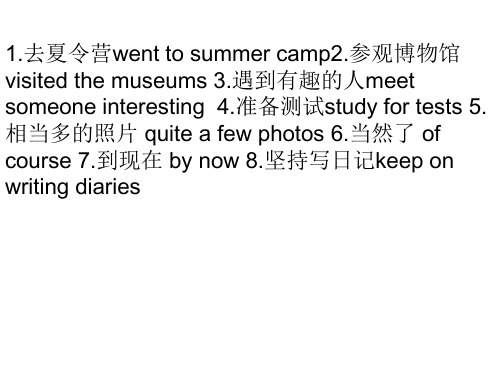
• 8.由于坏天气我们看不到下面的任何东西. • We couldn't see anything below because of the bad weather. • 9.食物尝起来很棒因为我很饿. • The food tasted great because I was hungry. • 10.我相当累,但是从山顶上看城市看起来美极了. • I was really tired but the city looked beautiful from the top of the mountain. • 11.你感觉这次旅行怎么样? • What do you think of the trip? • 12.我没有从马来西亚带来任何东西. • I didn't buy anything from Malaysia. • 13.有人看看地图发现我们不在山顶附近的任何地方. • Someone looked at the map and found out we weren't anywhere near the
Chinese traders from 100 years ago • 9.喜欢在城镇周围散步 • enjoy walking around the town
• 10.向上走到顶 walk up to the top • 11.开始有点下雨 start raining a little • 12.等待…; 等着去做…; 迫不及待做… can't /couldn't wait to do sth. • 13.下大雨 rain hard/heavily • 14.又湿又冷 wet and cold • 15.带来足够地钱 bring enough money • 16.忘记带雨伞 forget to take an umbrella • 18.在上午9:30出发 start at 9:30 a.m. • 19.沿途 along the way • 20.大约一小时以后①about one hour later • 21.再走两个小时①walk for another two hours • 22.学习重要的东西 learn something important • 23.在你回家的路上 on your way home • 24.在我们的学校之旅中on our school trip • 25.带上了一个有食物和水的包 bring/take a bag with food and water • 26.查明(事实) find out • 27.坚持走 keep (on)running • 28.兴奋地跳上跳下jump up and down in excitement
I went to Chinatown in New York yesterday

Guess and say .(What did you do at the weekend?)
• A:Did you see a friend? • B:No,I did't. • A:Did you do sport? • B:Yes,I did. • A:Did you go swimming? • B:Yes,I did.
I went to Chinatown in New York yesterday.
6.4 范馨元
Open your note book.
Words
Chinatown money everywhere
Phrase
go to Chinatown Chinese people
spoke
lion dance subject
• I went to a library yesterday.It is very big.It has books, CDs and computers.My favourites are books about the US and Canada...
• Dear Julie,
• I wrote a story in English class yesterday.My teacher liked it very much!I want to write a book when I am big.I want to visit many countries and write about them...
Guilin桂林
THANK YOU
Listen and say.
Yesterday,I went to Chinatown. I saw a lion dance there. Look at this photo. You can see it now.
动词过去时态复习
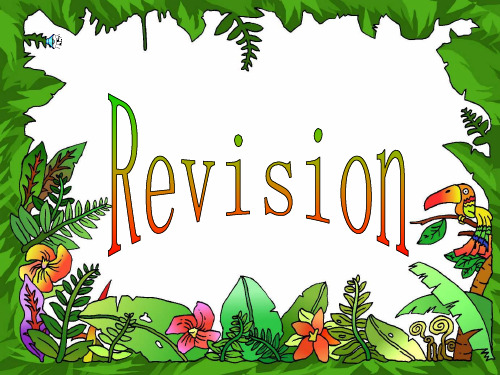
结构: 主语+动词过去式 常见时间状语: yesterday, yesterday morning (afternoon, evening…) last night (week, month, year…) two days ago, a week ago, three years ago… in 1990, (in 1998…) this morning, on my fifth birthday,
三、变换句式。
一)变一般疑问句。
1.We visited our friends last night.
Did you visit your friends last night?
2.My mother made a birthday cake for me last Sunday.
d your mother make a birthday cake for you last Sunday?
washed (wash) my coat myself two 12. I __________ hours ago.
13. When I ______(wake) up in the morning, I woke _______(find) a package next to my bed. found 14.They ______(swim) in a river when they swam _____(are) children. were 15.Linda’s parents _______(send) her a new sent scooter. 16.Bill ______(give) a speech yesterday. gave
北京版六年级英语上册第三单元知识点

Unit 3 知识点Lesson 9一、动词原形及过去式(需背、默)do----did 做take----took 拿取miss----missed 错过go----went 去come----came 来fly----flew 飞find----found 寻找leave----left 离开,忘了带drive----drove 驾驶,开车二、重点词组(需背、默)1. take a trip ------ took a trip 旅行2. come back ------ came back 回来3. miss our flight------ missed our flight 错过了我们的航班4. go back ------ went back 回去5. last Sunday 上周日6. last weekend 上周末7. at the airport 在机场8. in the hotel 在旅馆9. on Monday 在周一10. angry 生气的三、重点句型(需背、默)1. ---- Where did you go last weekend? 上个周末你去哪儿了?---- We flew to Hangzhou. 我们飞去了杭州。
2. ---- Where did you go yesterday afternoon? 昨天下午你去哪儿了?---- We drove to Xiangtan. 我们开车去了香山。
3. ---- Where did you go on Friday morning?周五上午你去哪儿了?---- We took the train to Tianjin. 我们坐火车去了天津。
四、我会说How do you go to school?How did you go to Hangzhou?I go to school by bike. I went to Hangzhou by car.I was very happyI’m sorry to hear that. Your parents must be upset.Lesson 10一、动词及过去式(需背、默)buy—bought买am/is—was是are—were是go—went 去do—did 做visit—visited 参观see—saw 看见take—took 拿,获得feed—fed 喂养二、重点词组(需背、默)1. fantastic. 极好的2. go(went)there by air 坐飞机去那3. green hills 绿色的山4. the West Lake 西湖5. go(went)around 参观,走访6. sound special. 听起来很特别三、重点句型(需背、默)1.---- How did you go to Hangzhou? 你们怎么去杭州?---- We went there by air. 我们坐飞机去那儿。
小学英语精讲精析 We went to the Great Wall
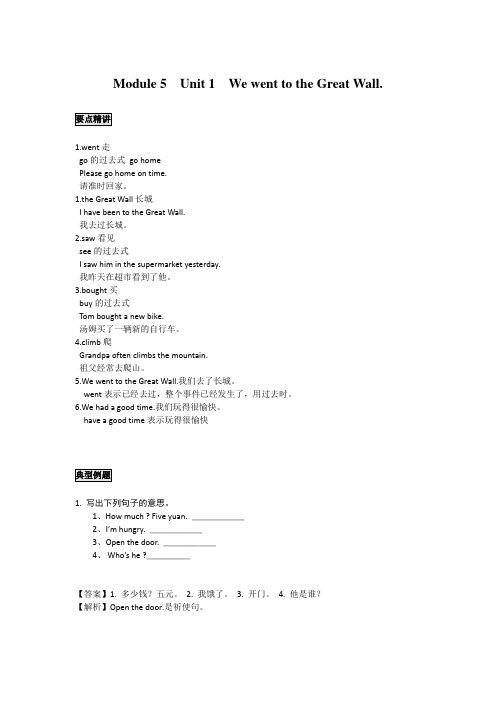
Module 5 Unit 1 We went to the Great Wall.1.went走go的过去式go homePlease go home on time.请准时回家。
1.the Great Wall长城I have been to the Great Wall.我去过长城。
2.saw看见see的过去式I saw him in the supermarket yesterday.我昨天在超市看到了他。
3.bought买buy的过去式Tom bought a new bike.汤姆买了一辆新的自行车。
4.climb爬Grandpa often climbs the mountain.祖父经常去爬山。
5.We went to the Great Wall.我们去了长城。
went表示已经去过,整个事件已经发生了,用过去时。
6.We had a good time.我们玩得很愉快。
have a good time表示玩得很愉快1. 写出下列句子的意思。
1、How much ? Five yuan. ______2、I’m hungry.______3、Open the door. ______4、Who’s he ?_____【答案】1. 多少钱?五元。
2. 我饿了。
3. 开门。
4. 他是谁?【解析】Open the door.是祈使句。
根据汉语完成句子。
(10分)1、我想要两个香蕉。
I want _________ __________.2、我还想要十个梨。
I also want _________ __________.3、那个西瓜很便宜。
That ____________ is very cheap.。
三种时态的区别

三种时态的区别一般现在时构成(1. 一般的动词词尾+s。
2. 以sh/ch/s/x/o结尾的词+es. 3. 以辅音字母y结尾的把y变成i,+es.) 速记:主语不是第三人称单数的就喜欢显摆自己,老是不做任何点缀就出来,主语是第三人称单数的老是显摆自己的东西多,所以老是带个“s”或“es”。
现在进行时的构成:人的大头(主语)+人的胳臂(is/am/are)+人的腿(ing)动词ing变化规则:1.直接+ ing(例:sleeping/doing/studying/playing\watching..) 2.去掉不发音的e加ing(例:use-using/make-making/exercise-exercising/ride-riding/dance-dancing/have-having) 3.重读闭音节,以一个元音字母加一个辅音字母结尾的词,要双写尾字母再加ing(例:swimming、running/shopping/sitting/writing)一般过去时的谓语动词要用动词的过去式。
动词过去式的构成分规则变化和不规则变化两种形式,不规则变化通常需要逐个记忆,规则变化则遵循以下原则:(1) 一般在动词后加-ed。
如:play—played, watch-watched,milk-milked(2) 在以字母e结尾的动词后,只加-d。
如:like—liked, dance-danced,use-used,live-lived,exercise-exercised,skate-skated...(3) 在以“辅音字母+y”结尾的动词后,则改y为i,再加—ed。
如:study-studiedcarry-carried,cry-cried,worry-worried,copy-copied(4) 在重读闭音节结尾,末尾只有一个辅音字母的动词,双写最后一个辅音字母,再加-ed。
如:plan—planned, stop-stopped,shop-shopped口诀:一般ed; e尾d; 辅y改y为ied; stop/shop双尾ed. 不规则要牢记:is/am-was;are-were;has/have-had;do/does-did;go-went;get-got;ride-rode;drive-drove;wake-woke come-came;run-ran;sit-sat;sing-sang;swim-swam;give-gave;drink-drank;buy-bought;teach-taught; draw-drew;grow-grew;know-knew;throw-threw;blow-blew;eat-ate;fly-flew;feed-fed;hear-heard;m ake-made;take-took;tell-told;see-saw;say-said一般现在时、一般过去时、现在进行时综合练习一、写出下列动词的三单形式、现在分词和过去式。
六年级一般过去时

just now 刚才
• • 主语+谓语 •
• •
be动词(was,were) 助动词(did) 情态动词(could,might) 实义动词(有确切含义的动词,可
以单独做谓语,如:played 等)
例如: • They were happy. • He played football. • You did your homework.
used lived woke kept said cleaned bought played learnt/ed saw read stopped
ran run borrow borrowed grew grow watch watched wrote write smiled smile
open begin swim carry study finish
一般过去时
1.定义: 一般过去时态表示过去某个时 间发生的动作或存在的状态,在表 示过去一段时间内经常或反复发 生的动作或习惯状态,也用一般 过去时,在一般过去时,动词用 其过去式形式,不受主语人称和 数变化的影响。
谓语变化
规则动词过去式的构成
1、一般词尾加-ed。 stay→stayed help -- helped ask -- asked look→looked 2、e结尾的只加-d。 hope→hoped dance -- danced love -- loved live→lived
• III.句型转换 – They came to China in 1990.(变一般疑问句) Did come • __________ they ________ to China in 1990? • 2.I was ill for two days last week? (同上) • ________ Were you ill for two days last week? • 3. The twins go to school on foot every day. (同上) Do go • _________ the twins _______ to school on foot every day? • 4.She washed the clothes last Sunday. ( 变否定句) wash the clothes last Sunday • She _________ ________ didn’t
习题
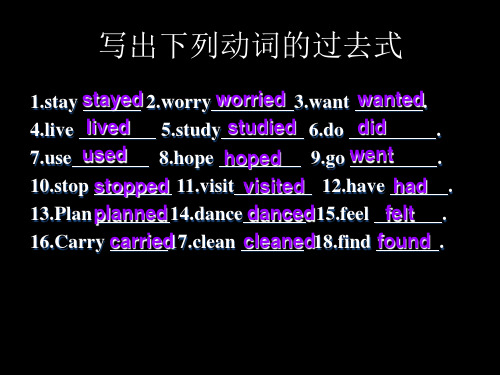
二、根据汉语完成句子
• • • • • • • 1.你的周末过得怎么样?好极了。 1.你的周末过得怎么样?好极了。 你的周末过得怎么样 ? It was gret . How was your weekend 2.你上周末做什么了?我去看我妹妹了。 2.你上周末做什么了 我去看我妹妹了。 你上周末做什么了? What did you do last weekend ? I visited my sister. 3.昨晚我学习地理了。 3.昨晚我学习地理了 昨晚我学习地理了。 I studied Geography yesterday evening. 4.你上周末做作业了吗? 4.你上周末做作业了吗 你上周末做作业了吗? Did you do your homeworklast weekend? • 5.你什么时候弹吉他的?昨天晚上。 5.你什么时候弹吉他的 昨天晚上。 你什么时候弹吉他的? • When did you play the guitar? Last night.
随堂练习
1.I
C soccer yesterday. A. play B. plays C. played D. playing 2.What you B last night? A. do,do B. did,do C. did,did D. do,did C 3.What about a party?
• 1. I played tennis last weekend.(对划线部分提问) weekend.(对划线部分提问) What did you last weekend? do 2. Did she go to the park on weekends? (做否定回答) (做否定回答 做否定回答) No • ,she didn’t . 3. They went to the beach last Sunday.(对划线部分提问 Sunday.(对划线部分提问 • Where did they go last Saturday/? • 4. She cleaned her room yesterday.(改为一般疑问句) yesterday.(改为一般疑问句 改为一般疑问句) • Did she clean her room yesterday?? • 5.He played computer games last night.(对划线部分提 night. 问) When did he play • computer games?
河南省八年级英语下册Unit9Haveyoueverbeentoamuseum解题方法技巧

河南省八年级英语下册Unit9Haveyoueverbeentoamuseum解题方法技巧单选题1、—Hi, Tom! _________ you ever _________ the Bird’s Nest?—Yes, I have. It’s fantastic.A.Have; been toB.Have; gone toC.Did; go to答案:A句意:——嗨!汤姆!你去过鸟巢吗?——是的,我去过。
那太棒了!考查现在完成时。
由答语“Yes, I have.”可知,问句用现在完成时,排除C项;have been to表示“曾经去过某地(现在已经回来了)”;have gone to表示“去了某地(还没有回来)”。
分析语境可知,此处是问“你曾经去过鸟巢吗?”,应用have been to。
故选A。
2、—Do you like English?—Yes, but I think__________ is a great challenge to learn the language well.A.thatB.thisC.it答案:C句意:——你喜欢英语么?——是的,但是我认为把语言学好是一种挑战。
考查代词。
that那个;this这个;it它。
think后是省略that的宾语从句,不定式“to learn the language well”是从句的真正的主语,此处用it做宾语从句的形式主语。
故选C。
3、—Where’s your English teacher?— She ________ to Beijing. She’ll be back in a week.A.has beenB.has goneC.goesD.went答案:B句意:——你的英语老师在哪儿?——她去了北京。
她将在一周后回来。
考查动词时态。
have been to…“去过某地”;have gone to…“去了某地”,根据“She’ll be back in a week.”可知,她去了北京,现在不在这儿,用“have/has gone to +地点”来表示。
延续性动词练习
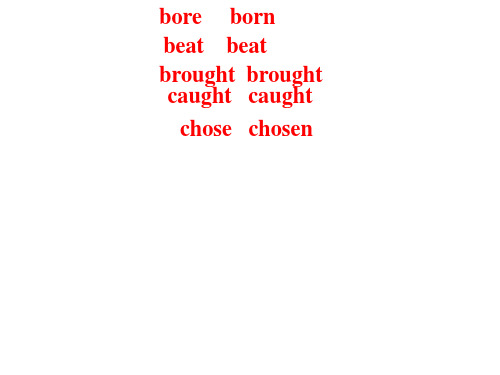
来/去 come /go——be in /at --1)他半小时前去参加聚会了。 He went to the party half an hour ago.
2)他已经去参加聚会了。 He has gone to the party.
3)他已经去参加聚会半个小时了。 He has been at the party for half an hour. He has been at the party since half an hour ago.
参加 join——be in/a member of --1)他两年前参了军。 He joined the army two years ago.
2)他已经参军了。 He has joined the army.
3)他已经参军两年了。 He has been in the army for two years. He has been a member of the army for two years. He has been a soldier for two years.
醒来 wake up——be awake 1)我10分钟以前醒了。 I bought the book two days ago. 2)我已经醒了。 I have woken up. 3)我已经醒了10分钟了。 I have been awake for 10 minutes. I have been awake since 10 minutes ห้องสมุดไป่ตู้go.
done drunk driven eaten fallen found flown got given gone grown
买: buy——have 1)我两天前买了那本书。 I bought the book two days ago. 2)我已经买了那本书了。 I have bought the book. 3)我已经买了那本书两天了。 I have had the book for two days. I have had the book since two days ago.
Unit1IwenttoLosAngelestwoyearsago.
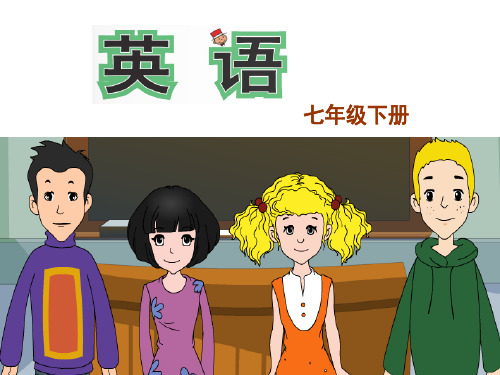
Step 4:Group discussion 小组讨论 Now answer the questions. (P61)
1. How did Betty get to Los Angeles? She went there by plane./She flew there.
2. How did Betty get to her friends' home? Her friends drove her.
4. _T_w_o__y_e_a_rs__a_g_o_I went back to our family home and _s_a_w___my grandparents.
Step 6: Complete the table 完成表格
Name Where When How did How long What did
辨析excited与exciting
excited
adj . 兴奋的;激动的。指 Are you excited about going
人或事物对……感到兴奋, to Australia?
主语常是人。
去澳大利亚你兴奋吗?
The teacher told us an adj . 令人兴奋的;使人激
exciting story . exciting 动的。指人或事物本身令人
Language points 1.It takes/took sb some time to do sth
花费某人多长时间做某事
Tom花了半小时写作业: I_t_t_o_o_k_T_o_m___h_a_lf_a_n__h_o_u_r__to__fi_n_i_sh__h_i_s_h_o_m__e_w_o_r_k_.
Step 2:Write down the present form(现在时) of these verbs.
新概念一册一般过去时练习题

write did 6. When ________ you _________(write) this song?I __________(write) it last year. wrote 7. My friend, Carol, ___________(study) for the studied math test and __________(practice) English last practiced night. Did 8. ________ Mr. Li __________(do) the project on do Monday morning? Yes, he didn’t _________. 9. How _________(be) Jim's weekend?It was _________(be not) bad. wasn’t Was 10. ________ (be) your mother a sales assistant last year?No. she __________. wasn’t
一般过去时练习讲解
一、
go – goes-went-going enjoy – enjoys – enjoyed- enjoying buy – buys- bought- buying eat –eats- ate- eating get-gets- got- getting walk – walks- walked- walking take – takes-took- taking dance- dances-danced- dancing
二. 用括号内所给动词的适当形式填空。 用括号内所给动词的适当形式填空。
(1) May________ (finish) her homework very late yesterday evening. (2) Han Mei _____(bring) her pet to the park that day. (3) His father ______(buy) a new computer for him last week. (4) Miss Du________(walk) to work every day last term. (5) We ______ (move) to Shenyang8 years ago. (6) ____you _____(have) bread for breakfast this morning? (7) She ______(give) me a nice present last night.
246个包含ent的常用英语单词

/5kCrI5spBndEnt/ 通讯 /I5fIFEnt/ 有效率 /tZnt/ 帐篷 /sE5fIFEnt/ 充分 /dI5pZndEnt/ 依靠 /5sQbsI5kwZnt/ 后来的 /5frikwEnt/ 频繁 /5dVZntl/ 温和 /In5vZnt/ 发明 /rZnt/ 租借 /5ZvEdEnt/ 明显 /In5tZlEdVEnt/ 聪明 /5disnt/ 正派的 /In5tZnt/ 专心的 /5kBntEnEnt/ 大陆 /5tAlEntId/ 有天才的 /pE5rZntl/ 父母亲的 /5AksZnt/ 重音 /kEn5sZnt/ 同意 /Qn5prZsE5dZntId/ 空前的 /5pAtnt/ 专利 /sZnt/ 气味 /5grAnd5pZrEnt/ 祖父母 /5rZntl/ 租赁 /5njutrIEnt/ 有营养的 /In5hIrEnt/ 固有的 /5sQbsI5kwZntlI/ 随后 /pE5sIstEnt/ 持续的 /5EdVEnt/ 紧急地 /kEn5vinjEnt/ 方便 /dI5sZnt/ 降下 /mAg5nIfEsEnt/ 高尚的 /5supErIn5tZndEnt/ 主管 /In5WjuzI5AstIk/ 热心 /5Absnt/ 缺席 /5prZsEdEnt/先例 /5pEmEnEntlI/ 永远的 /kEn5stItFuEnt/ 选举者 /prE5pEunEnt/ 支持者 /5kBmpEtEnt/ 有能力
correspondent efficient tent sufficient dependent subsequent frequent gentle invent rent evident intelligent decent intent continent talented parental accent consent unprecedented patent scent grandparent rental nutrient inherent subsequently persistent urgent convenient descent magnificent superintendent enthusiastic absent precedent permanently constituent proponent competent
关于假期去哪了的英语作文

关于假期去哪了的英语作⽂关于假期去哪了的英语作⽂ 在我们平凡的⽇常⾥,⼤家都不可避免地会接触到作⽂吧,作⽂是经过⼈的.思想考虑和语⾔组织,通过⽂字来表达⼀个主题意义的记叙⽅法。
那么,怎么去写作⽂呢?以下是⼩编收集整理的关于假期去哪了的英语作⽂,欢迎⼤家借鉴与参考,希望对⼤家有所帮助。
假期去哪了的英语作⽂篇1 I went to Hainan with my family this vacation.I think Hainai is a beautiful city.I have a greattime!First,I went to the beach.I played beach volleyball .Then I went swimming.After that,I went to shopping and bought some suvior.Of course,I ate some sea food,it was really nice.In the end,I took a walk aroud the city park!I took lots of photos!This a worderful vacation what I like,I want to go again,how about you? 假期去哪了的英语作⽂篇2 Last weekend.i went to the Haikou park and I went to there by bus.I think there are so beautiful.many people in there do excises and play game and so on.I were very happy and I will go there in the next weekend! 假期去哪了的英语作⽂篇3 I like the summer holiday every year. This summer I went to Beijing for my holiday, Beijing is our capital city. I went to the Summer Palace, climbed the Great Wall and went to many places of interest. I had a very good time. During this summer holiday, I went to Putuo and Xiangshan. I saw the beautiful sea. I enjoyed having a walk along the beach after supper or having a swim in the moonlight. Its really "cool". 假期去哪了的英语作⽂篇4 Cindy,Sarah,Kirsty and sally s school hoilday is coming .they re talking about their school hoilday. Cindy:Tomorrow is our school hoilday.what shall we going to do? Sarah:Shall we going to the Changjiang River Cruise?We can take some beautiful photos. Kirsty:Oh!That s boring.I even like go to beijing Road and buy some new clothes. Sally:I don t like to buy clothes.I want go far some.Let s go to shenzhen .And play Window of the World, and all of us are going to have fun there. Cindy: The admission ticket was too costly, and I feel to climb a mountain better play.Lets go to BaiYun hill together. Kirsty: I m agree.climbing a mountain breathe fresh air. Sarah:. Good idea. We should make use of weekend to toughen body. Sally: Lets go to BaiYun hill together!。
一次难忘的旅行英语作文
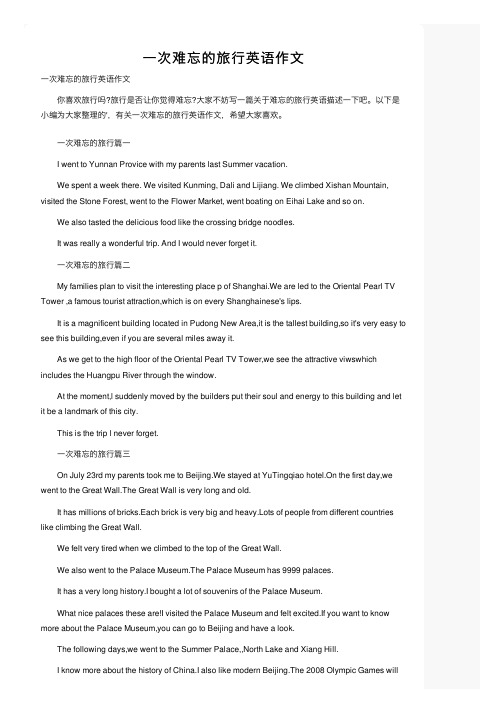
⼀次难忘的旅⾏英语作⽂⼀次难忘的旅⾏英语作⽂ 你喜欢旅⾏吗?旅⾏是否让你觉得难忘?⼤家不妨写⼀篇关于难忘的旅⾏英语描述⼀下吧。
以下是⼩编为⼤家整理的',有关⼀次难忘的旅⾏英语作⽂,希望⼤家喜欢。
⼀次难忘的旅⾏篇⼀ I went to Yunnan Provice with my parents last Summer vacation. We spent a week there. We visited Kunming, Dali and Lijiang. We climbed Xishan Mountain, visited the Stone Forest, went to the Flower Market, went boating on Eihai Lake and so on. We also tasted the delicious food like the crossing bridge noodles. It was really a wonderful trip. And I would never forget it. ⼀次难忘的旅⾏篇⼆ My families plan to visit the interesting place p of Shanghai.We are led to the Oriental Pearl TV Tower ,a famous tourist attraction,which is on every Shanghainese's lips. It is a magnificent building located in Pudong New Area,it is the tallest building,so it's very easy to see this building,even if you are several miles away it. As we get to the high floor of the Oriental Pearl TV Tower,we see the attractive viwswhich includes the Huangpu River through the window. At the moment,l suddenly moved by the builders put their soul and energy to this building and let it be a landmark of this city. This is the trip l never forget. ⼀次难忘的旅⾏篇三 On July 23rd my parents took me to Beijing.We stayed at YuTingqiao hotel.On the first day,we went to the Great Wall.The Great Wall is very long and old. It has millions of bricks.Each brick is very big and heavy.Lots of people from different countries like climbing the Great Wall. We felt very tired when we climbed to the top of the Great Wall. We also went to the Palace Museum.The Palace Museum has 9999 palaces. It has a very long history.I bought a lot of souvenirs of the Palace Museum. What nice palaces these are!I visited the Palace Museum and felt excited.If you want to know more about the Palace Museum,you can go to Beijing and have a look. The following days,we went to the Summer Palace,,North Lake and Xiang Hill. I know more about the history of China.I also like modern Beijing.The 2008 Olympic Games willbe held in Beijing. Later,I went back with my parents by plane.I really enjoyed the trip to Beijing. ⼀次难忘的旅⾏篇四 ast Sunday we had a short trip to Beidaihe. We set out in the school bus at 7:20am。
一般过去时
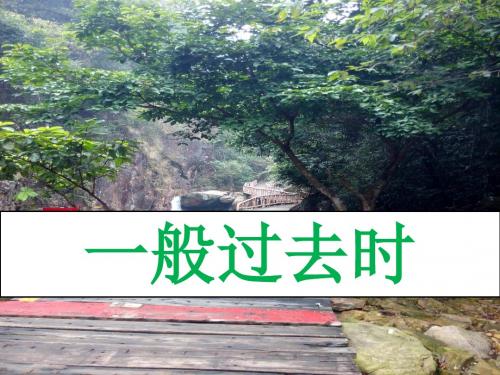
动词变化规则
规则变化 +ed clean →cleaned Want → wasnted 有e, →+d use →used love →loved 辅+y →ied try →tried cry →cried 重读闭音节→双写辅音+ed stop →stopped bed → begged 不规则变化 同动词原形 Put let hit beat cost cut read 变形 Am/is →was are →were see → saw eat →ate go →went come →came fly →flew buy →bought
三、句型转换 1. He came here last month. (改为否定句) He _______ _______ here last month. 2.They played football this morning. (改为一般疑问句并作简略回答) —______ they _______ football this morning? —Yes, they _______./No, they _________ . 3.They went to Beijing last year. (就划线部分提问) _________ _________ they ________ last year. 4.Tom watched TV last night. (改为一般疑问句) _______ Tom _______ TV last night? 5.Mary does homework every day. (用 last night 改写句子) Mary ________ ____________ _________ ________ .
- 1、下载文档前请自行甄别文档内容的完整性,平台不提供额外的编辑、内容补充、找答案等附加服务。
- 2、"仅部分预览"的文档,不可在线预览部分如存在完整性等问题,可反馈申请退款(可完整预览的文档不适用该条件!)。
- 3、如文档侵犯您的权益,请联系客服反馈,我们会尽快为您处理(人工客服工作时间:9:00-18:30)。
山西中小企业发展现状及对策研究中小企业问题是一个世界性的课题。
各国经济的发展表明:中小企业的发展是经济增长的大战略。
改革开放以来,山西中小企业取得长足发展,已成为全省国民经济持续快速增长的重要支撑力量。
中小企业能否与时俱进,健康发展,是事关山西经济发展全局的重大问题。
本报告依据山西第二次基本单位普查资料,研究分析了山西中小企业的现状特点,提出了对策和建议,希望能够对政府决策部门制定实施促进和扶持中小企业发展政策起到参考作用。
一、山西中小企业发展现状和特点中小企业一般是指除国家确认为大型企业之外的所有企业,包括中型、小型企业和雇员在8人以下的具有法人资格的微型企业。
山西中小企业量大面广,从管理体制、资本构成等方面分析,可分为四个特点鲜明的企业群体。
一是改革开放前,在计划经济条件下以国有和集体资本创建的中小企业,主要分布在城镇和矿山,从业人员主要是具有城镇户口的非农业人员;二是改革开放后,迅速发展起来的乡镇企业群体,主要分布在农村,从业人员主要是农村剩余劳动力;三是近年来快速发展的民营企业群体,主要分布在科技型产业和新兴产业部门;四是三资企业。
根据山西第二次基本单位普查资料分析,我省中小企业主要有以下特点:1、数量多,比重大,投资主体多元化。
截止2001年底,山西省有各类中小企业法人单位6万余家(这里按从业人员500人以下的企业为中小企业计算。
),约占全省企业总数的98%以上;从业人员达300余万人,占全省企业从业人员总数的63%。
在全省中小企业总数中,工业中小企业大约占43%,建筑业中小企业占3.3%,第三产业中小企业占44%。
城镇个体工商户在国外也属于小企业的范畴,称之为“微型企业”或“特小型企业”。
到2001年底,全省工商个体户达到55.1万户,从业人员107.2万人,营业收入389.2亿元。
近年来,随着我国经济体制改革的不断深化和市场化程度的逐步提高,中小企业的管理体制和资本构成发生了较大变化。
以工业中小企业为例,在总资本(实收资本)构成中,国家资本占30.7%,集体资本占21.4%,法人资本占20.6%,个人资本占21.9%,港澳台资本占1.8%,外商资本占1.7%。
中小企业总资本仍以国家资本和集体资本为主体,但私人资本已占有较大份额,并呈快速发展态势。
以集体资本和私营资本为主体的民营资本已占到总资本的2/3,今后随着国有经济布局和结构战略性调整步伐的不断加快,这一变化将更加迅速和深化。
2、行业分布广泛,传统产业为主体。
山西中小企业主要集中在制造业、采掘业、批发零售贸易餐饮业和建筑业等行业,大多是依托当地自然资源和劳动力优势发展起来的,基本属于“资源型”和“传统型”行业。
工业中小企业生产范围广泛,涉及国民经济行业近40个,主要集中在煤炭、冶金、化学、机械、建材等行业。
从行业分布排序情况看,营业收入比重最高的是煤炭采选业,占20.9%。
紧随其后的依次为:黑色金属冶炼及压延加工业占12.6%,炼焦业占9.1%,化学原料及化学制品制造业占7.5%,非金属矿物制品业占7.4%,,电力、蒸汽、热水的生产和供应业占7.3%,普通机械制造业占4.3%,金属制品业占3.9%,有色金属冶炼及压延加工业占3.4%,专用设备制造业占3%。
上述十大工业行业的营业收入占到全省工业中小企业总计的79.4%。
中小工业企业产业结构的重型化特征十分明显。
服务业中小企业中,交通运输、仓储及邮电通讯业和批发零售贸易、餐饮业及旅馆业等传统产业中小企业占有较大比重,其从业人员和经营收入分别占到服务业中小企业从业人员总数和营业收入总计的23.3%和40%。
3、地区发展不均衡,区域化特征明显。
受资源禀赋、产业基础和经济发展水平等多方面因素影响,山西中小企业地区分布不均衡状态较明显。
全省拥有工业中小企业较多的地市依次是临汾、太原、运城、晋中和长治等市,五市工业中小企业单位数合计占全省工业中小企业总数的61.6%,从业人员占55.5%。
地区分布的又一个特征是服务业中小企业在工业化和城市化水平较高的地区如太原、阳泉、长治等市发展较快、比重较高;而工业中小企业则在人均经济总量偏低、工业化水平低的地区发展快、比重高。
临汾、运城、忻州和吕梁每千人拥有工业中小企业的数量分别为16个、22个、27个和19个,均比全省平均水平(15个)高。
四地市的人均GDP虽然排在全省11个地市的第8位、9位、10位和11位,处落后位次,但每千人拥有的工业中小企业单位数却排在前列,分别居第5位、2位、1位和3位。
中小企业区域化发展特征也十分明显。
目前除煤炭开采业、建材业和农副产品加工业遍布全省外,一些以中小企业支撑的产业集群发展,逐步形成了区域经济发展特色。
如清徐县的暖气片和食醋制造、定襄的法兰盘制造、太谷的玛钢铸造、孝义和介休的焦炭冶炼、晋城的生铁冶炼和铸造、山阴的乳制品加工、侯马的商贸流通和太原的高新技术产业等,都已成为当地特色经济的支柱产业。
有的市县还形成了“一乡一业、一村一品”的行业分布格局。
4、产出规模小,技术装备水平低,结构性矛盾突出。
山西中小企业大多生产劳动密集型产品,企业的规模比较小。
全省中小企业户均从业人员为41人,户均营业收入333.7万元。
在中小企业中,营业收入在50万元以下的企业占28.9%,50-100万元之间的企业占24.3%;100-500万元的占46.6%。
规模以上工业小型企业的平均资本金只有186.7万元,约为中型企业的的7.9%,为大型企业的1.5%;平均每个小企业的年营业收入279.1万元,为中型企业的9.4%,大型企业的1.7%。
中小企业产品结构初级化、技术结构低度化、组织结构分散化,结构性矛盾十分突出。
在工业中小企业营业收入中,采掘业的比重约占到1/4,医药、化纤、电子通讯、电气机械和仪器仪表等高新技术产业的比重仅占3.3%。
中小企业产品、产业结构与大中型企业高度同构化。
以中小企业为主体的乡镇工业与大工业结构相似系数高达0.9,由此产生的后果是中小型企业在市场上面临着同大企业的正面冲突,市场萎缩,利润下降,在竞争中处于极其不利的地位。
1990年,全省规模以上工业中型和小型企业的资金利税率为7.08元和10.66元,到2000年减少到3.83元和4.65元,分别下降了46%和56.4%,均明显高于大型企业26%的降幅。
相当一部分的中小企业经营困难,亏损严重,许多企业处于停产状态,破产的企业迅速增多。
中小企业产业组织与组织结构严重不合理,企业规模结构分散化现象十分严重。
中小企业与大企业间关联度小,协作配套不普遍、不紧密,不能形成互补互利关系,阻滞了产业结构转换和升级。
5、管理方式较落后,生存和发展环境不够宽松。
山西中小企业中,相当一部分企业仍习惯于传统型的经营管理模式,缺乏现代企业的管理理念和管理手段,对市场的适应和把握能力不强,生产经营的盲目性很大,短期行为严重,创新能力不强。
据省统计局对200家中小企业问卷调查显示,77.5%的企业没有通过ISO9000系统认证,只有7%的企业尝试做过电子商务,88%的企业没有一项自己的技术发明。
而企业管理落后的症结是企业制度创新缓慢,企业家素质不高。
长期以来,由于对中小企业普遍重视不够,观念陈旧、思路模糊,措施不力,使中小企业发展缺乏良好的外部支持环境。
一是对中小企业管理不力。
现行中小企业管理基本沿袭着计划经济体制的管理模式,按照所有制关系和隶属关系,分别由不同部门管理。
如乡镇企业由省乡镇企业局管理,个体私营企业由省工商部门管理,科技型企业由省科技厅和省经贸委管理,进出口贸易企业和“三资企业”由省外贸厅管理等。
一种管理体制,政出多门,政策交叉,互相矛盾,不利于中小企业健康发展。
虽然山西已在省经贸委设立了中小企业处,专司全省中小企业综合协调工作,但受诸多因素制约,仍然不能有效克服多部门交叉管理的弊病。
二是对中小企业扶持的力度不够。
到目前全省还没有形成系统的、针对性和实效性较强的中小企业扶持和促进政策,即使政府出台的一些中小企业优惠政策,也比较零散,有的还不具普惠性。
中小企业特别是非国有中小企业,发展环境不宽松,市场准入不公平,还没有真正享受平等的国民待遇,税费重,融资难的问题尤为突出。
三是社会化服务体系还没有形成。
政府建立的综合性的服务机构正在起步,还不能有效整合引导社会中介服务资源,为中小企业提供优质、高效、规范服务。
专业性商业服务机构缺乏管理,收费过高,质量没保证,不能很好地为中小企业提供灵活多样、及时有效的服务。
社会化服务体系建设滞后,使处于弱势地位的中小企业缺乏必要的环境依托,增加了经营成本,难以优化配置生产要素,这是制约山西中小企业健康发展的重要因素。
二、中小企业在山西国民经济发展中的特殊地位和作用中小企业历来在山西国民经济和社会生活中扮演着重要角色。
随着社会主义市场经济的不断发展,中小企业在推动经济增长、缓解就业压力、促进科技进步、满足多样化的社会需求和优化经济结构等方面的地位和作用日益突出地显示出来。
1、中小企业是山西经济发展的坚实基础,是最具活力的增长点。
中小企业数量多、分布广、发展快、影响大。
据统计,到2001年末,全省中小企业(法人单位)实现营业收入1975亿元,占各类企业营业收入总计的53%。
在工业中,中小企业占到工业企业总数的99%以上,中小企业创造的工业总产值和上缴税金分别占到工业总量的70%和60%左右。
近年,中小企业提供了约85%以上的新增工业产值。
中小企业已经成为山西国民经济的重要支撑力量和持续快速发展的动力源增长点。
在当前我国内需不足和经济结构加速转换的形势下,能否启动中小企业快速发展,对保持山西经济稳定增长,进而实现跨越式发展至关重要。
2、中小企业是就业和再就业的主渠道,是促进全省社会稳定的重要保证。
创造就业机会是中小企业最重要的经济作用之一。
在山西工业中,中小企业提供了城镇2/3的就业机会。
以同样的固定资产投资计,中小型企业吸纳的劳动力相等于大型企业的1.8倍。
在以劳动密集为主的第三产业中,中小企业单位投产容纳的劳动力和新增的劳动力更多。
90年代以来,山西从业人员增加了近100万人,大约85%以上的新增就业岗位是由中小企业提供的。
以中小企业为主体的民营企业1998年以来,累计只吸纳下岗职工26万人,其中国有企业下岗职工有10万多人。
中小企业已成为失业人员重新就业和新增劳动力就业的主渠道。
随着经济体制改革的深化和结构调整步伐的加快,山西就业和再就业的问题将越来越突出。
有关方面分析,今后3年,全省劳动力供给总量高达340万人左右,同期省内可提供的新的就业岗位只有120万人,供需矛盾十分突出。
只有大力发展中小企业,才能拓展就业渠道、缓解城镇就业压力、保持社会稳定。
3、中小企业适应性强,成长快,机制灵活,是山西产业结构调整的生力军。
